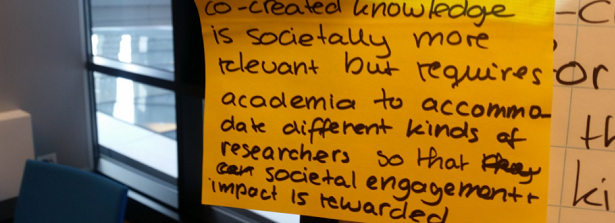Reflection on “Research & policy: two peas in a pod? A dialogue for food security impact”

Research & policy related to food security: can they be seen as two peas in a pod? Or are bridges between the ‘world of research’ and the ‘world of science’ still scarce and hard to build? The Food & Business Knowledge Platform and NWO-WOTRO Science for Global Development organized a conference with the aim to improve the links between research and policy.
The Governance and Inclusive Development group, also the driving force behind the Centre for Sustainable Development Research (CSDS), contributed to this conference by co-organizing three sessions on themes related to food security: Knowledge co-creation (Theme 4), Capture fisheries, aquaculture and food security (Theme 5) and Urban food systems (Theme 6). This article highlights the key findings of these three sessions. Concept notes which were written prior to the conference can be found at the website of the Food & Business Knowledge Platform.
Key findings session on Knowledge co-creation (theme 4) organized by Mirjam Ros-Tonen and Edith van Ewijk and chaired by Adrie Papma.
Knowledge co-creation on food security can be defined as joint learning and knowledge co-creation processes through which farmers, value chain actors, practitioners, policymakers and researchers negotiate and create new knowledge. By so doing, knowledge co-creation goes beyond unidirectional ‘research uptake’. Based on two world café sessions, participants concluded that knowledge co-creation requires:
- Clarity about roles and expectations of various actors in knowledge co-creation processes. ‘Just ask and don’t presume what other actors expect’ as one of the participants put it.
- A different kind of science which accommodates both ‘research for impact’ and ‘research for excellence’. This requires more incentives to stimulate research for societal impact. At the same time space should be safeguarded for critical research as certain research questions will be missed out if science is led by practice and policy only.
- Awareness of the politics of knowledge: co-creation processes between various partners are closely related to politics and power relations. Central questions in any co-creation process should be: whose societal relevance is at stake, whose knowledge is taken into account? Who determines which questions are or are not addressed?
Key findings session on Capture fisheries, aquaculture and food security (theme 5), organized by Joeri Scholtens & Frejus Thoto (ACED, Benin)
- Fisheries and aquaculture are the orphans on the international and the Dutch food security and nutrition agenda. This is a remarkable and unjustifiable omission, given the vital nutritional value provided by fish to 3 billion people, and its provision of >100 million livelihoods, especially in low-income and food deficient countries. This ignorance is arguably resulting from a dominant concern with the declining health of oceanic ecosystems and overfishing practices. These two agendas need to be reconciled by better distinguishing between different types of fisheries from a food security perspective.
- Both aquaculture and capture fisheries have an important role to play in providing fish to nutritionally vulnerable populations and the dichotomy between the two has become unproductive. The challenge is to go beyond the focus on producing more fish more efficiently, but rather pay attention to fish chains as a whole and the challenge of making fish accessible to those who need it most.
Key findings on session Urban food systems (theme 6) organized by Nicky Pouw, Donald Houessou and Dzidzo Tawiah-Yirenyia and chaired by Marja Spierenburg
- Although, small urban food producers are vital to food and nutrition security of vulnerable populations in Africa’s growing cities, urban food security for all cannot be achieved by these small producers alone. Urban-rural linkages need to be developed to establish more efficient and effective food value chains. Urban policy should protect the (small) urban farmers – they also contribute to green spaces in the city and people’s knowledge and exposure to nature and the origins of their local food plate.
- Inclusive value chains that counter exclusionary mechanisms and lower transaction costs for the poorest, whilst at the same time adhering to circular economy principles can be developed to enforce disruptive change of an unsustainable urban economic food system. Where circular economy, on the one hand, is perceived as expensive and difficult, on the other hand it offers new potentials for sustainability and economic viability to move hand in hand. For example, by collecting the massive amounts of urban waste and turning it into organic fertilizer – thus contributing to sustainable farming and re-using urban waste. Urban policies should build public awareness about urban waste and invest in collective initiatives.
- Sustainable agribusiness solutions do not necessarily come from ‘outside’: local knowledge and existing practices already comprise sustainable alternative solutions (e.g. for biodegradable plastics). However, African policy and business stakeholders need to acknowledge the value of these local knowledges and solutions more, systematically document and exchange these, and pursue their professionalization and upscaling with confidence. Africa’s local knowledge and practices have a great contribution to make to the international and Dutch endeavor for more sustainable production and consumption.





